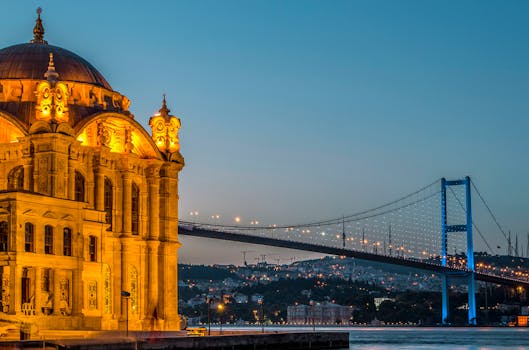Istanbul, Turkey: Crossroads of East and West

Istanbul, a city where continents meet, offers a unique blend of cultural and historical richness. Located on the banks of the Bosphorus Strait, this Turkish metropolis bridges Europe and Asia, creating a melting pot of traditions, architecture, and lifestyles. This distinctive geographical position has made Istanbul a significant center of trade, politics, and culture for centuries.
Stepping into Istanbul is like traveling through time. The city's landscape is dotted with remnants of its Byzantine and Ottoman past, from the majestic Hagia Sophia to the intricate designs of the Blue Mosque. These iconic landmarks not only draw millions of tourists each year but also serve as a testament to the city's diverse heritage. Modern Istanbul, however, is not just about historical sites; it pulses with vibrant markets, contemporary art scenes, and bustling nightlife.
What truly sets Istanbul apart is its ability to harmoniously blend old and new. While you can explore ancient bazaars like the Grand Bazaar and Spice Bazaar, you can also find cutting-edge fashion boutiques and gourmet restaurants. This juxtaposition provides an experience that caters to various interests and tastes, making Istanbul a fascinating destination for travelers worldwide.
The Historical Significance
Istanbul's history spans over two millennia, making it one of the oldest continuously inhabited cities in the world. Originally known as Byzantium, it was later renamed Constantinople when it became the capital of the Roman Empire under Emperor Constantine the Great. This era saw the construction of many significant monuments that still stand today.
The Hagia Sophia, built in 537 AD, is one such monument. Initially a cathedral, it was later converted into a mosque during the Ottoman period and now serves as a museum. Its massive dome and exquisite mosaics are architectural marvels that draw visitors from around the globe.
Another noteworthy site is the Topkapi Palace, which served as the primary residence of Ottoman sultans for nearly 400 years. This sprawling complex offers a glimpse into the opulence and grandeur of Ottoman court life.
The city's strategic location also made it a crucial hub for trade along the Silk Road, connecting Asia with Europe. This historical significance has left an indelible mark on Istanbul's cultural fabric, making it a city rich in stories and experiences.
Cultural Fusion
Istanbul's unique position at the crossroads of East and West has fostered a rich cultural tapestry. The city's cuisine is a prime example of this fusion, blending Mediterranean flavors with Middle Eastern spices. Dishes like kebabs, mezes (appetizers), and baklava are local favorites that reflect this culinary diversity.
The city's markets are another testament to its cultural blend. The Grand Bazaar, one of the world's largest and oldest covered markets, offers everything from traditional Turkish carpets to modern souvenirs. Meanwhile, the Spice Bazaar tantalizes visitors with its array of herbs, spices, dried fruits, and nuts.
Art and music also play significant roles in Istanbul's cultural landscape. The city hosts numerous festivals throughout the year, celebrating everything from classical music to contemporary art. Venues like the Istanbul Modern Museum and Pera Museum showcase both Turkish and international artists.
Religious diversity further enriches Istanbul's cultural scene. While predominantly Muslim, the city is home to various religious communities, including Christians and Jews. This coexistence is evident in the city's architecture, where mosques stand alongside churches and synagogues.
Modern Attractions
Beyond its historical landmarks and cultural offerings, Istanbul boasts a plethora of modern attractions. The city's skyline is punctuated by skyscrapers that house luxury hotels, business centers, and shopping malls.
One such development is Zorlu Center, a mixed-use complex featuring high-end shops, restaurants, theaters, and residential units. It's a symbol of Istanbul's rapid modernization and economic growth.
The city's public transportation system has also seen significant improvements in recent years. The Marmaray Tunnel beneath the Bosphorus connects the European and Asian sides of Istanbul by rail, facilitating easy travel across the city.
For those seeking outdoor activities, Istanbul offers several parks and waterfront promenades. Emirgan Park is famous for its tulip festival each spring when thousands of tulips bloom in vibrant colors.
Travel Tips
Navigating Istanbul can be overwhelming for first-time visitors due to its sheer size and diversity. Here are some tips to make your trip smoother:
- Public Transport: Invest in an Istanbulkart for convenient access to buses, trams, ferries, and metro lines.
- Bargaining: Haggling is common in markets like the Grand Bazaar; don't hesitate to negotiate prices.
- Cultural Sensitivity: Dress modestly when visiting religious sites such as mosques.
- Local Cuisine: Try street foods like simit (a type of bread) and balik ekmek (fish sandwich) for an authentic taste of Istanbul.
Where to Stay
Istanbul offers a wide range of accommodations to suit different budgets and preferences:
| Area | Description | Recommended Hotels |
|---|---|---|
| Sultanahmet | Close to major historical sites like Hagia Sophia and Topkapi Palace | Four Seasons Hotel Sultanahmet |
| Beyoğlu | Known for its vibrant nightlife and shopping streets | The Marmara Taksim Hotel |
| Bosphorus Strait | Offers stunning views of the Bosphorus waterway | Çırağan Palace Kempinski |
Istanbul stands as a testament to human ingenuity and resilience through its rich history and vibrant present. It offers something for everyone: historical landmarks for history buffs, bustling markets for shoppers, diverse cuisine for food lovers, and modern amenities for contemporary travelers.